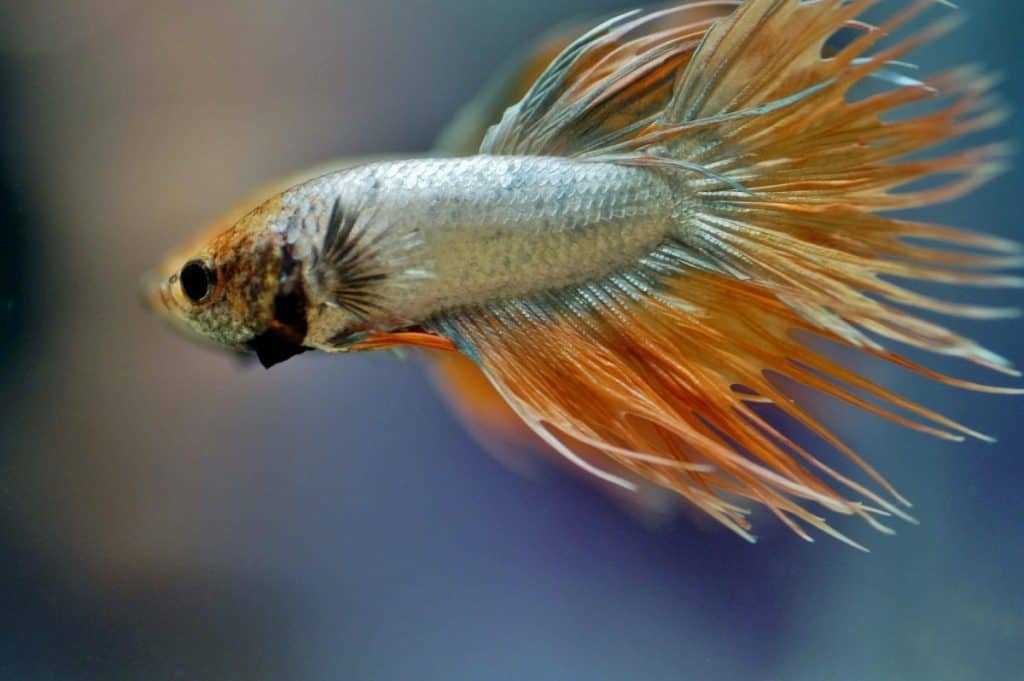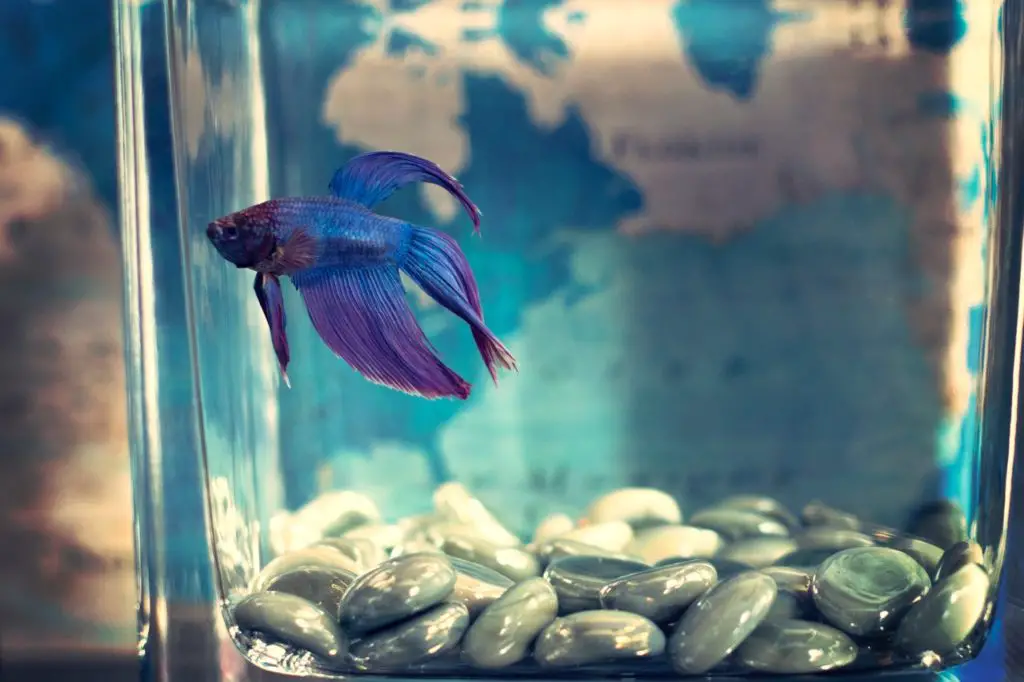Have you ever been curious about the size of a betta fish? Betta fish are one of the most popular species for aquarists, and it’s no wonder why. They’re incredibly beautiful and can add color to any tank! But how big do they get? As an experienced betta fish keeper, I will tell you about their size.
A Betta fish typically grows to about 2.5 inches (6.35 cm) in length, although some species can grow up to 3 inches (7.62 cm). The size of a Betta fish can be influenced by factors such as diet, water quality, and genetics.
In addition to their length, betta fish vary significantly in weight; some specimens weigh just a few grams, while others tip the scales at over 20 grams. This wide range allows them to fit into different environments easily. So if you’ve got your heart set on adding some betta flair to your tank, there’s sure to be one that fits perfectly with your setup!
Overview Of Betta Fish
Betta fish are popular for many aquarists due to their bright coloration, ease of care, and hardiness. These tropical freshwater fish originate from Thailand, where they’re known as Siamese fighting fish. Betta Fish come in two types: the Short Finned and Long Finned varieties. They can be found in various colors, including red, blue, yellow, and multicolored patterns such as marble or butterfly. The lifespan of betta fish is typically 2-3 years when cared for properly.
The tank size required for housing bettas depends on several factors, such as the number of inhabitants, the type of filtration system used, and other decorations in the aquarium. Providing plenty of open swimming space for these active swimmers, an ideal size would be at least five gallons per adult fish. Decorations should also be provided – driftwood, live plants, and hiding places all make great additions!

Characteristics Of Betta Fish
Betta fish are captivating freshwater fish known for their vibrant colors and personalities. They typically grow to be around 2-3 inches long and can come in various colors, including red, yellow, blue, green, orange, brown, and black. Betta fish have an average lifespan of 3-5 years when given the proper care. It’s important to note that betta fish need warm water between 76°F – 82°F with high oxygen levels to thrive.
Regarding behavior and temperament, bettas tend to display quite a bit of attitude! While some may be more docile than others, they all retain an inherent sense of curiosity, often leading them to explore new places or investigate any changes in their environment. If conditions permit, Bettas also love interacting with humans and other tankmates, such as small shrimp or snails. Proper care is essential for keeping these fish happy, so regular water changes should always be done, along with plenty of hiding spots and decorations for enrichment.
Bettas come in many types based on their physical traits, such as long-finned varieties like the Halfmoon or Crowntail or short-finned ones like the Plakat or Veiltail. There are also double-tail variants like the Delta Tail, which have two separate tails instead of just one. Regardless of type, each specimen has its own unique personality, making them a fascinating choice for anyone looking to adopt a pet fish!
Average Size Of Betta Fish
Betta fish are known for their remarkable size, averaging between two and three inches. However, it is possible to find specimens growing up to five or six inches! This makes betta fish quite unique in comparison to other species of fish; they have a much wider range of sizes than most types. Betta size ranges from anywhere between one and six inches, depending on the type of betta you own. The maximum betta size limit is six inches, which is extremely rare.
It’s important to remember that proper care is important when determining how big your betta will get. With enough space and nutrition, your pet may exceed its expected size range by several inches, so ensure you’re providing them with a comfortable environment to thrive. Proper diet and tank maintenance also play a role in helping your betta reach its full potential growth-wise! If you take great care of your pet, then there’s no telling how large they could become.

Factors Influencing the Size of a Betta
Now that we’ve discussed the average size of betta fish, let’s look at what factors may influence the growth rate and ultimate size. Primarily, tank size can affect the overall growth of a betta. When kept in too small an environment, a betta will not be able to reach its full potential size. Therefore, when considering your own living situation for your pet fish, it is wise to choose a tank that is as large as practical.
Water temperature also plays an important role in determining how big a betta gets. The optimal water temperature range for most bettas is between 75-80°F; temperatures outside this range can stunt their growth or cause illness. Additionally, providing appropriate nutrition is key for healthy growth – quality food sources are essential for developing strong bones and muscle mass, which can help maximize their final body size. Genetics also comes into play here; certain lines of domesticated show-quality fish tend to have larger builds due to selective breeding over many generations. Lastly, gender differences should be noted: males tend to grow slightly bigger than females on average, but both types can display wide variation in size depending on conditions such as those listed above.
Numerous external influences affect the development and maximum attainable size of a betta fish beyond just genetics alone! With careful consideration of these environmental details–such as proper aquarium setup and feeding regime – you’ll be well on your way to having a happy and healthy pet with impressive stature!
Considerations For Betta Fish Owners
Betta fish are captivating creatures that make excellent pets. As betta owners, it is important to know the specific care needs of these remarkable animals. Betta fish typically reach about 3 inches in length when fully grown; however, their size largely depends on the quality of care they receive. With proper betta fish care and a tank size of at least 2 gallons, your pet can grow up to 5 inches long!
When setting up a home for your beloved betta, the temperature is also an essential factor. The optimal water temperature should range between 72-78 degrees Fahrenheit. Additionally, feeding habits must be taken into account as well. Bettas do best when offered small meals two or three times a day rather than one large meal each day. Plus, if you want to create a community aquarium with other fish species, ensure that all potential tankmates are peaceful and not aggressive toward your betta. It is recommendable to research any additional aquatic inhabitants carefully before adding them to the same environment as your finned friend.
Overall, caring for a betta requires knowledge and dedication from its owner – but the rewards are worth it! By ensuring you provide appropriate housing conditions, such as adequate space and suitable temperatures combined with regular feedings tailored specifically for these unique fish – you will have a healthy companion who will bring joy to many years ahead!
What Is The Best Tank Size For A Betta Fish?
Figuring out what size tank is best for a betta fish can be tricky. Betta tanks come in all shapes and sizes, so understanding the needs of your betta will help you make an informed decision about your home. As a betta expert, I recommend considering these three factors when choosing a tank:
- Size:
- It’s important to choose an aquarium with ample room for swimming and exploring; most experts suggest at least 5 gallons for one fish.
- While some opt for larger tanks with multiple levels or dividers, it’s essential to provide enough floor space to ensure they have sufficient room.
- Remember that filters require extra water volume, so consider this before purchasing a large filter system!
- Setup:
- When setting up a betta tank, consider adding decorations like plants and rocks to create natural hiding spots and interesting obstacles for them to explore.
- Substrates such as sand or gravel should also be added; however, avoid sharp objects which could harm delicate fins.
- Additionally, if planning on keeping live plants, ensure they are compatible with the type of lighting used on the tank.
- Maintenance:
- Once the setup is complete, maintaining good water conditions is key to ensuring your fish’s health – regular water changes are necessary every two weeks, depending on how heavily stocked your tank is.
- Aqueon products such as Aquarium Water Changers make quick work of weekly maintenance while still providing optimal filtration throughout the process.
- Lastly, monitor ammonia and nitrite levels regularly using test strips or liquid drop test kits available online or at local pet stores.
Choosing the right size tank and creating an environment suitable for your betta can go a long way towards promoting their health and happiness — from selecting a small starter kit ideal for desktop use to designing something more elaborate suited for any dedicated aquascape — there’s no shortage of options when it comes to giving your betta its perfect home! With proper preparation and knowledge of care requirements, you can easily find the right fit regardless of budget constraints or limited space situations.
Frequently Asked Questions
Conclusion
Overall, betta fish are a wonderful pet to have in your home, and they come in many beautiful colors. They’re relatively easy to take care of as long as you know what size tank they need and the types of food they should eat. It’s important to keep the water clean and change it regularly so that their environment is healthy. With proper care, a betta can live up to 5 years, giving you plenty of time to bond with your new friend!
I strongly advise against keeping multiple fish in one tank. Betta fish are territorial and may fight if there isn’t enough space or hiding places. If you want more than one betta in your aquarium, be sure to provide ample room plus lots of decorations like plants and rocks where each individual can find their own spot.
In conclusion, having a betta fish as a pet is rewarding and enjoyable but requires some knowledge about its needs to ensure it has a happy life with you. By understanding how big they get, what type of food to give them, how often to change the water, and how long they typically live – you’re well on your way to being an expert yourself!
